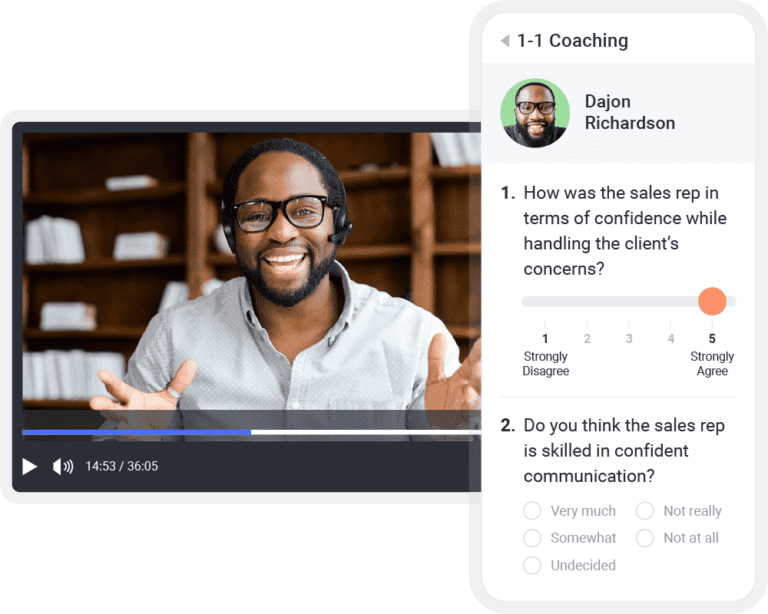It’s no secret that proper sales coaching can majorly impact sales performance. A recent analysis found that top sellers receive significantly more sales coaching than their lower-performing peers. That’s no coincidence.
Chances are, there’s plenty of deal coaching happening at your organization. That’s the kind of coaching focused on discussing open opportunities, how they’re progressing, and what needs to happen to get them across the finish line.
Skill coaching, however, often gets pushed to the back burner. That’s unsurprising, as skill coaching typically requires more time and effort than deal coaching. But it’s also problematic, as skill coaching is critical to improving your reps’ behaviors long-term – and their performance in the field.
With some guidance, you can ensure skill coaching is consistent across your organization and impacts rep performance quarter after quarter.
Read on to explore what skill coaching is, why it’s important, and what metrics you need to start measuring to deliver more effective skill coaching that boosts your bottom line.
What is skill coaching?
First, let’s give a quick overview of skill coaching and how it differs from deal coaching.
Focuses on the deals in front of a seller, and the open opportunities they have and are actively working. This type of coaching typically takes place between a manager and a rep weekly, discussing the details of each deal, any blockers, the next steps, and the probability of closing.
Focuses on the seller themselves, and more specifically the key skills they need to be successful at their job. Skill coaching sessions typically happen on a monthly or quarterly basis, as it takes time to show improvement.
Orgs that pair deal and skill coaching together see a
Deal coaching and skill coaching are both strategic techniques for guiding sellers on how they can be more effective. Paired together, they can result in an improvement of win rates by 27% or more.
Why do skill coaching metrics matter?
Now that you know the why of skill coaching – what is the point of measuring and tracking performance related to skill coaching?
Metrics matter because they are the driving force behind delivering effective skill coaching.
If you have a team of reps and want to focus on delivering skill coaching without any data, you may pick one skill to coach your team each month.
For example, you choose discovery and focus on assessing and building this skill for each rep. If one member is already very strong in his or her discovery skills, this could be a waste of time for this person. At the same time, another member may have a larger gap in discovery skills and needs more than a month to develop this skill.
Without metrics, you can’t deliver tailored skill coaching that focuses on each team member’s individual skill gaps.

20+ coaching metrics for effective skill coaching
In order to start tracking skill coaching metrics, you must first know exactly what skills make up a top performer in your organization. And this varies by role, industry, and product/service offering.
For example, a Sales Development Representative at a tech company may need strong skills in:
- Active listening: Being attuned to a prospect’s verbal and nonverbal communication so you can understand where they’re coming from and respond appropriately.
- Market research: Conducting research about prospects to determine who is (and isn’t) a good fit for your solutions.
- Written communication: Effectively communicating via email and other written communication.
- Self-motivation: Staying on task and productive without someone standing over your shoulder.
While a seasoned Account Executive at a manufacturing company needs strong:
- Discovery: Effectively engaging with a prospect early in the purchase journey to determine whether they’re a good fit and entice them to take the next step
- Problem-solving: The ability to identify solutions to challenges and objections that arise throughout the sales process.
- Negotiation: The back-and-forth discussions are often required to reach a mutually beneficial agreement.
- Presentation: Clearly conveying information and the value of your solution throughout the purchase journey.
Using these competency frameworks, you can now start measuring the critical metrics that will drive your skill coaching efforts for each of your customer-facing roles.
Let’s break down the metrics by commonly used skills for go-to-market roles. Low scores in any of these areas can indicate a need for additional coaching.
Product and service knowledge metrics
Your reps are responsible for articulating the value of your solutions day in and day out. As such, they must become experts on your products and services.
You can measure product and service knowledge using a variety of metrics including:
- Product/service program scores
- New product/service release update scores
- Correct answers on assessments and quizzes
- Certification completions
Active listening metrics
The best sales reps are those who have mastered the art of active listening. They remain present and avoid distractions during their interactions with prospects. These reps also ask the right questions to keep buyers engaged and ensure they understand what their prospects are communicating.
Some key metrics to gauge active listening skills include:
- Conversation intelligence call scores
- Talk time % on calls vs attendees
- Conversation rate of calls to meetings booked
Written communication metrics
In the past, many B2B deals were struck in the boardroom or on the golf course. Today, many deals happen without a buyer and seller in the same room.
Modern sellers must have strong written communication skills to effectively engage with buyers via email, messaging applications, digital sales rooms, and other digital communication channels.
Written communication skills can be measured using metrics like:
- # of emails sent
- Sentiment score on emails
- # of responses to emails vs emails sent
Rapport building metrics
According to a recent report, 84% of business buyers expect sales reps to act as trusted advisors. When a sales rep can build rapport and earn a prospect’s trust, the prospect is more likely to make a purchase.
Some metrics for tracking a rep’s ability to build rapport include:
- Conversion rate of calls to meetings booked
- Conversion rate of emails to meetings booked
Presentation metrics
There’s no way around it: sales reps must have excellent presentation skills. Sellers must be able to effectively and efficiently present information to prospects to propel them forward in the sales cycle.
Video role-play scores are one way to track sellers’ presentation skills. Sellers can practice their skills by recording a role-play, and they receive AI-powered scores and feedback in real-time.
Another key metric to track is conversion by deal stage. If a seller has excellent presentation skills, their prospects are more likely to advance to the next deal stage.
You can also use conversation intelligence tools to track presentation metrics including:
- Talk time % on calls vs attendees
- Filler words used
- Sentiment on calls
- Questions asked by prospects on calls
- Questions asked by presenter
- Monologue length
Multi-threading metrics
Multi-threading is a strategy that involves building more than one relationship within a business. Strong multi-threading skills are necessary, as the typical B2B buying group includes up to 10 stakeholders.
Multi-threading skills can be measured using metrics like:
- # of contacts engaged per opportunity
- # of contacts accepted/attending meetings
- # of C-level contacts engaged per opportunity
Objection-handling metrics
Sales reps are bound to encounter objections from prospects. Objections don’t necessarily mean a deal is doomed. If reps have mastered objection-handling skills, they can overcome these obstacles – and move more deals forward.
Some key metrics to track to measure mastery of objection-handling skills include:
- Sentiment on calls
- Questions asked by prospect in calls
- Questions asked by presenter
- Competitor mentions
Key metrics for effective skill coaching
| Product/service knowledge | Product/service program scores |
| New product/service release update scores | |
| Correct answers on assessments and quizzes | |
| Certification completions | |
| Active listening | Conversation intelligence call scores |
| Talk time % on calls vs attendees | |
| Conversion rate of calls to meetings booked | |
| Written communication | # of emails sent |
| Sentiment score on emails | |
| # of responses to emails vs emails sent | |
| Building rapport | Conversion rate of calls to meetings booked |
| Conversion rate of emails to meetings booked | |
| Presentation | Video role-play scores |
| Conversion by deal stage | |
| Talk time % on calls vs attendees | |
| Filler words used | |
| Sentiment on calls | |
| Questions asked by prospect in calls | |
| Questions asked by presenter | |
| Monologue length | |
| Multi-threading | # of contacts engaged per opportunity |
| # of contacts accepted/attending meetings | |
| # of c-level contacts engaged per opportunity | |
| Objection handling | Sentiment on calls |
| Questions asked by prospect in calls | |
| Questions asked by presenter | |
| Competitor mentions |
Measuring the impact of your skill coaching
Seeing all of these metrics in one list can be a bit overwhelming. We recommend starting small. Focus on 2-3 top skills for your direct reports and start tracking a handful of metrics for each of these skills to gauge where individuals are excelling or where they may need some focused skill coaching. Then, you can continue tracking these metrics over time to determine the effectiveness of your coaching and add additional metrics to track.
Remember, all of these skills should be measured against larger KPIs and business goals of your reports, like:
- Revenue generation
- Quota attainment
- Pipeline conversion
- Average deal size
- Conversion by deal stage
Tap into technology to deliver effective skill coaching at scale
Deal coaching is an important way to improve the outcome of a single deal. But winning revenue organizations know they must also deliver skill coaching to improve reps’ long-term behaviors and sales performance.
It all starts with tracking the right metrics. Once you know each sales rep’s strengths and weaknesses, you can deliver tailored coaching to close skill gaps and improve performance.
The right technology is key to delivering scale effective deal and skill coaching. But adding a point solution may not be the right approach.
Mindtickle is an integrated revenue enablement platform for training, coaching, content, conversation intelligence, digital sales room, and more. With Mindtickle, you can easily pinpoint each rep’s weaknesses and deliver tailored coaching that improves skills and performance.
Measure Sales Coaching
Make sure skill coaching is consistent and impacts rep performance quarter after quarter.
Get a DemoThis post was originally published in November 2022, updated in September 2023, and again in October 2024.



 By Helen Waite
By Helen Waite

 By Rahul Mathew
By Rahul Mathew